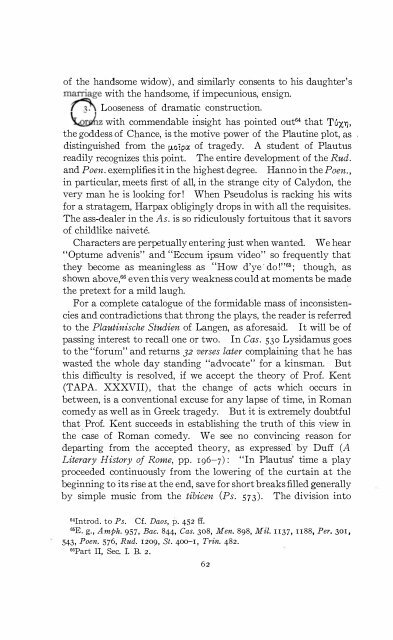Create successful ePaper yourself
Turn your PDF publications into a flip-book with our unique Google optimized e-Paper software.
of the handsome widow) , and similarly consents to his daughter's<br />
marriage with the handsome, if impecunious, ensign.<br />
Looseness of dramatic construction.<br />
z with commendable insight has pointed out64 that T6x'Y),<br />
the goddess of Chance, is the motive power of the Plautine plot, as<br />
distinguished from the fJ.OtpO! of tragedy. A student of Plautus<br />
readily recognizes this point. The entire development of the Rud.<br />
and Poen. exemplifies it in the highest degree. Hanno in the Poen. ,<br />
in particular, meets first of all, in the strange city of Calydon, the<br />
very man he is looking for ! When Pseudolus is racking his wits<br />
for a stratagem, Harpax obligingly drops in with all the requisites.<br />
The ass-dealer in the As. is so ridiculously fortuitous that it savors<br />
of childlike naivete.<br />
Characters are perpetually entering just when wanted. We hear<br />
"Optume advenis" and "Eccum ipsum video" so frequently that<br />
they become as meaningless as "How d'ye ' do !"65 ; though, as<br />
shown above,66 even this very weakness could at moments be made<br />
the pretext for a mild laugh.<br />
For a complete catalogue of the formidable mass of inconsistencies<br />
and contradictions that throng the plays, the reader is referred<br />
to the Plautinische Studien of Langen, as aforesaid. It will be of<br />
passing interest to recall one or two. In Cas. 530 Lysidamus goes<br />
to the "forum" and returns 32 verses later complaining that he has<br />
wasted the whole day standing "advocate" for a kinsman. But<br />
this difficulty is resolved, if we accept the theory of Prof. Kent<br />
(TAPA. XXXVII), that the change of acts which occurs in<br />
between, is a conventional excuse for any lapse of time, in Roman<br />
comedy as well as in Greek tragedy. But it is extremely doubtful<br />
that Prof. Kent succeeds in establishing the truth of this view in<br />
the case of Roman comedy. We see no convincing reason for<br />
departing from the accepted theory, as expressed' by Duff (A<br />
Literary History of Rome, pp. 196-7) : "In Plautus' time a play<br />
proceeded continuously from the lowering of the curtain at the<br />
beginning to its rise at the end, save for short breaks filled gerrerally<br />
by simple music from the tibicen (Ps. 573). The division into<br />
64Introd. to Ps. Cf. Daos, p. 452 II.<br />
6sE. g., A mph. 957, Bac. 844, Cas. 308, Men. 898, Mil. 1137, u88, Per. 301,<br />
543, Poen. 576, Rud. 1209, St. 400-1 , Trin. 482.<br />
66Part II, Sec. 1. B. 2.<br />
62
















